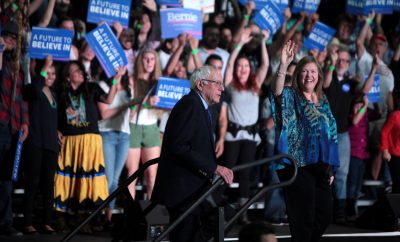 Image courtesy of [Ash Carter via Flickr]
Image courtesy of [Ash Carter via Flickr]
Elections
Lincoln Chafee: The Democratic Primary Welcomes a New Underdog
Former Rhode Island Governor Lincoln Chafee formally announced his run for the Democratic presidential bid on Wednesday, June 3. Chafee joins a few other declared Democratic presidential candidates, with Bernie Sanders and Hillary Clinton garnering the most support thus far at 12.8 percent and 61.2 percent respectively. Given Chafee’s relative obscurity, however, he seems to be a bit of a long shot candidate.
Chafee’s moment of glory mainly comes from his work with Obama. Obama helped Chafee win the governorship in 2010 and then Chafee became one of Obama’s strongest supporters during his reelection campaign in 2012. Chafee seems to be mimicking some of Obama’s actions in the Democratic primary, especially Obama’s tactic of attacking the Iraq War vote to defeat Clinton in the 2008 race. Obama opposed the Iraq war from the beginning and in the 2008 Democratic presidential race, he persistently attacked Clinton for her decisions regarding the Iraq war. This attack point helped Obama defeat Clinton, and Chafee appears to be capitalizing on the same thing. He has launched his campaign with a focus on his dissenting vote in the Senate regarding the Iraq War in 2002. Chafee is using this to separate himself from Clinton, which is not an awful tactic considering that it’s a weak spot for the Democratic frontrunner.
In this aspect, Chafee joins O’Malley in being the only other Democratic presidential candidate to play a little dirty instead of focusing on the issues and policy reforms. Which, considering neither Clinton nor Sanders has resorted to the same kind of tactics, could backfire for Chafee immediately.
According to Chafee’s website, his four main platform points are an aversion to foreign entanglements, building a strong middle class, improving environmental stewardship, and the protection of personal liberties. Chafee’s past is actually most interesting aspect of his presidential bid–he entered politics as a Republican and then became an independent until he joined the Democratic Party in 2013. But Chafee is not at all worried with how his party-switching history will affect his popularity in the primary. In fact, his response to this concern was:
I have not changed. My old liberal Republican stand on the issues does line up with the Democratic Party—women’s reproductive freedoms, support for working families. I have a 30-year record.
Another notable aspect of Chafee’s presidential bid is his insistence on switching the United States to the metric system. His reasoning for doing so is to become “an internationalist country.” He believes that by switching to the metric system, among other moves, the United States will be giving a symbolic message to the rest of the world that it is ready to integrate into the world system instead of taking a unilateral approach to foreign policy.
Chafee’s run is undoubtably a long shot. But the same buzz surrounded Bernie Sanders when he first announced, and he is the only Democratic candidate who has threatened Clinton’s standing, even if only marginally so. Chafee seems focused on his role as the underdog and feels America has a particularly soft spot for that kind of status. But the problem is that both O’Malley and to a lesser extend, Sanders, have been running on a similar platform. So the Democratic presidential bid is turning into a contest between the established Clinton dynasty, a progressive-socialist independent Sanders, little known O’Malley, and now Chafee, the new underdog.








Comments